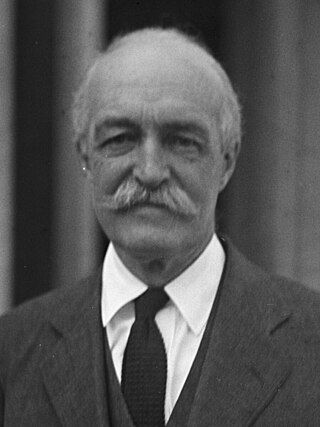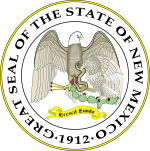
Frank Probasco Bohn was a politician from the U.S. state of Michigan. He served three terms in the United States House of Representatives from 1927 to 1933.

The 1926 United States Senate elections were elections for the United States Senate that occurred in the middle of Republican President Calvin Coolidge's second term. The 32 seats of Class 3 were contested in regular elections, and special elections were held to fill vacancies. The Republican majority was reduced by seven seats.

The 1924 United States Senate elections were elections for the United States Senate which coincided with the election of Republican President Calvin Coolidge to a full term. The 32 seats of Class 2 were contested in regular elections, and special elections were held to fill vacancies. The strong economy and Coolidge's popularity helped Republican candidates increase their majority by three. Republicans would gain a further two seats through mid-term vacancies bringing their seat share to 56-39-1.

The 1926 United States House of Representatives elections were elections for the United States House of Representatives to elect members to serve in the 70th United States Congress. They were held for the most part on November 2, 1926, while Maine held theirs on September 13. They occurred in the middle of President Calvin Coolidge's second term. Coolidge's Republican Party lost seats to the opposition Democratic Party, but it retained a majority. The most pressing national matters at the time were fragmented, generally related to government's relationship to business or to providing social aid. However, no predominant issue was able to cast a shadow over the election. The small, populist Farmer–Labor Party also held two seats following the election.

The Seventh Philippine Legislature was the meeting of the legislature of the Philippines under the sovereign control of the United States from 1925 to 1928.

The United States House of Representatives elections in California, 1926 was an election for California's delegation to the United States House of Representatives, which occurred as part of the general election of the House of Representatives on November 2, 1926. Republicans gained one seat in a special election held on August 31, 1926, after incumbent Democrat John E. Raker died.

The 1926 United States House of Representatives elections in South Carolina were held on November 2, 1926 to select seven Representatives for two-year terms from the state of South Carolina. All seven incumbents were re-elected and the composition of the state delegation remained solely Democratic.

The 1926 South Carolina United States Senate election was held on November 2, 1926, to select the U.S. Senator from the state of South Carolina. Incumbent Democratic Senator Ellison D. Smith won the Democratic primary and was unopposed in the general election to win another six-year term.

The 1986 United States Senate election in Idaho took place on November 4, 1986 alongside other elections to the United States Senate in other states as well as elections to the United States House of Representatives and various state and local elections. Incumbent Republican U.S. Senator Steve Symms narrowly won re-election to a second term. As of 2023, this remains the last time that a Senate election in Idaho has been decided by a single-digit margin. This election was the first time since 1926 that an incumbent Republican Senator from Idaho was re-elected to this seat.

The 1926 Oregon gubernatorial election took place on November 2, 1926 to elect the governor of the U.S. state of Oregon. The election matched incumbent Democrat Walter M. Pierce against Republican Isaac L. Patterson and Independent candidate H. H. Stallard, who ran on an anti-Prohibition platform. Patterson won by a wide margin.

The 1926 United States elections were held on November 2, 1926, in the middle of President Calvin Coolidge's second term. The Republican Party lost nine seats to the Democratic Party in the House of Representatives but retained their majority. The Republicans also lost six seats to the Democrats in the U.S. Senate but retained their majority. The Democratic gains in Congress were very modest for a midterm election, and since that time, the Republicans had not performed this well in midterm elections under a Republican president until 2002.

The 1926 United States Senate election in Pennsylvania was held on November 2, 1926. Incumbent Republican George W. Pepper, who was appointed following the death of Boies Penrose, was defeated for re-nomination by William Scott Vare. Vare won the election, defeating Democratic opponent William Bauchop Wilson. He was not permitted to assume office, however, until an investigation was conducted into possible election fraud and corruption. Vare was ultimately unseated in December 1929 by the Senate, following charges of corruption.

The 1930 Pennsylvania gubernatorial election occurred on November 4, 1930. Incumbent Republican governor John Stuchell Fisher was not a candidate for re-election. Republican candidate and former governor Gifford Pinchot defeated Democratic candidate John M. Hemphill to win a second, non-consecutive term as Governor of Pennsylvania.

The 1926 United States Senate election in Connecticut was held on November 2, 1926.

The 1926 United States Senate election in Indiana took place on November 2, 1926. Incumbent Republican Senator James E. Watson was re-elected to a second full term in office over Democratic attorney Albert Stump.

The 1926 United States Senate election in Louisiana was held on November 2, 1926. Incumbent Democratic Senator Edwin Broussard was elected to a second term in office.

The 1928 Massachusetts gubernatorial election was held on November 6, 1928.

The 1924 United States presidential election in Missouri took place on November 4, 1924 as part of the 1924 United States presidential election. Voters chose 18 representatives, or electors to the Electoral College, who voted for president and vice president.



















